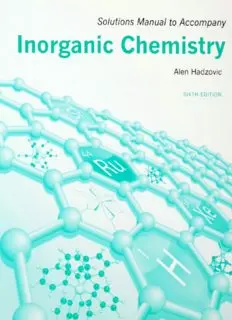
Solutions Manual for Inorganic Chemistry [Shriver’s Inorganic Chemistry, 6e] PDF
Preview Solutions Manual for Inorganic Chemistry [Shriver’s Inorganic Chemistry, 6e]
University LIBRARIES This book has been purchased by The Dean and Barbara Martin Endowed Book Fund in Chemistry To support and enhance the Department of Chemistry, Eberly College of Science, The Pennsylvania State University 2010 penn State ptNN State m CHSCiist'RY This book has been purchased by The Dean and Barbara Martin Endowed Book Fund in Chemistry To support and enhance the Department of Chemistrj, Eberly College of Science, The Pennsylvania State University June 2010 Solutions Manual to Accompany Inorganic Chemistry Sixth Edition Alen Hadzovic University of Toronto W. H. FREEMAN AND COMPANY New York OXFORD University Press Solutions Manual to Accompany Inorganic Chemistry, Sixth Edition © 2014,2010,2006, and 1999 by Oxford University Press All rights reserved. Printed in the United States of America First printing Published, under license, in the United States and Canada by W. H. Freeman and Company 41 Madison Avenue New York, NY 10010 www.whfreeman.com ISBN-13: 978-1-4641-2438-9 ISBN-10: 1-4641-2438-8 Published in the rest of the world by Oxford University Press Great Clarendon Street Oxford, 0X2 6DP United Kingdom www.oup.com ISBN-13: 9780198701712 ISBN-10: 0198701713 u TABLE OF CONTENTS Preface, v Acknowledgments, vii PART 1 Foundations Chapter 1 Atomic Structure 1 Chapter 2 Molecular Structure and Bonding 13 Chapter 3 The Structures of Simple Solids 27 Chapter 4 Acids and Bases 43 Chapter 5 Oxidation and Reduction 61 Chapter 6 Molecular Symmetry 79 Chapter 7 An Introduction to Coordination Compounds 89 Chapter 8 Physical Techniques in Inorganic Chemistry 101 PART 2 The Elements and Their Compounds Chapter 9 Periodic Trends 107 Chapter 10 Hydrogen 111 Chapter 11 The Group 1 Elements 119 Chapter 12 The Group 2 Elements 123 Chapter 13 The Group 13 Elements 127 Chapter 14 The Group 14 Elements 137 Chapter 15 The Group 15 Elements 145 Chapter 16 The Group 16 Elements 153 Chapter 17 The Group 17 Elements 159 Chapter 18 The Group 18 Elements 171 Chapter 19 The d-Block Elements 175 Chapter 20 d-Metal Complexes: Electronic Structure and Properties 181 Chapter 21 Coordination Chemistry: Reactions of Complexes 193 Chapter 22 d-Metal Organometallic Chemistry 201 Chapter 23 The f-Block Metals 213 PART 3 Frontiers Chapter 24 Materials Chemistry and Nanomaterials 217 Chapter 25 Catalysis 223 Chapter 26 Biological Inorganic Chemistry 233 Chapter 27 Inorganic Chemistry in Medicine 237 IV PREFACE This Solutions Manual accompanies Inorganic Chemistry, Sixth Edition by Duward Shriver, Mark Weller, Tina Overton, Jonathan Rourke, and Fraser Armstrong. Within its covers, you will find the detailed solutions for all self-tests and end of chapter exercises. New'^ to this edition of the Solutions Manual is the inclusion of guidelines for the selected tutorial problems—^those problems for which the literature reference is not provided—for the majority of chapters. Many solutions include figures specifically prepared for the solution, and not found in the main text. As you master each chapter in Inorganic Chemistiy, this manual will help you not only to confirm your answers and understanding but also to expand the material covered in the textbook. The Solutions Manual is a learning aid—its primary goal is to provide you with means to ensure that your own understanding and your own answers are correct. If you see that your solution differs from the one offered in the Solutions Manual, do not simply read over the provided answer. Go baek to the main text, reexamine and reread the important concepts required to solve that problem, and then, with this fresh insight, try solving the same problem again. The self-tests are closely related to the examples that precede them. Thus, if you had a problem with a self-test, read the preceding text and analyze the worked example. The solutions to the end of chapter exercises direct you to the relevant sections of the textbook, which you should reexamine if the exercise proves challenging to you. Inorganic chemistry is a beautiful, rich, and exciting discipline, but it also has its challenges. The self-tests, exercises, and tutorial problems have been designed to help you test your knowledge and meet the challenges of inorganic chemistry. The Solutions Manual is here to help you on your way, provide guidance through the world of chemical elements and their compounds and, together with the text it accompanies, take you to the very frontiers of this world. With a hope you will find this manual useful, Alen Hadzovic IV ACKNOWLEDGMENTS I would like to thank the authors Duward Shriver, Mark Weller, Tina Overton, Jonathan Rourke, and Fraser Armstrong for their insightful comments, discussions, and valuable assistance during the preparation of the sixth edition of the Solutions Manual. I would also like to express my gratitude to Heidi Bamatter, Editor for W. H. Freeman and Company, and Alice Mumford, Editor for Oxford University Press, for all of their efforts and dedication to the project. VI1 Vlll
